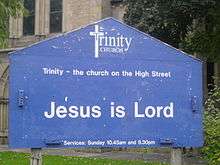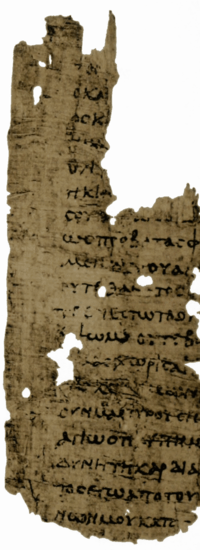Jesus is Lord

"Jesus is Lord" (Greek: Kurios Iesous) is the shortest credal affirmation found in the New Testament, one of several slightly more elaborate variations.(Kelly:13) It serves as a statement of faith for the majority of Christians who regard Jesus as both fully man and God. It is the motto of the World Council of Churches.
Background
In antiquity, in general use, the term 'lord' was a courtesy title for social superiors, but its root meaning was 'ruler'. Kings everywhere were styled 'Lord' and often considered divine beings so the word acquired a religious significance.(Richardson:130) When the Hebrew Bible was translated into Greek in the Septuagint long before Christianity, Kurios was used for the divine tetragrammaton JHVH which was no longer read aloud but replaced with adonai a special form of the Hebrew adon = 'lord'.(Whiteley:103f)
For a Christian to recognise Jesus as Lord caused problems for society. When in 27 B.C. Roman Emperor Octavian received the title of “Augustus” it carried religious overtones, suggesting a special relationship with the world of the gods, symbolised by the cult of the Emperor’s ‘genius’, a veiled form of emperor-worship.(Frend:16) To refuse to honor the national gods was unpatriotic and akin to sabotage.(Workman:44) By around 150 A.D. provincials had made up their minds that the Christians by refusing to worship the gods were responsible for all manner of ills such as famine, plague and earthquakes and of practices such as cannibalism and black magic.(Frend:70)
J.G. Davies comments that the Christian begins from the confession of Jesus as Lord – Jesus who is sovereign over the individual’s relation to the state, “we must understand the state in the context of the command to love one’s neighbour.”(Davies:48) He had earlier quoted from an article on ‘Priests and Socialism in Chile’ written in 1971 by Maruja Echegoyen: “Loving one’s neighbour, which is the first commandment by definition, today means working to destroy the structures that can destroy my neighbour, the people, the poor”.(NB)
Credal phrases in the New Testament

J.N.D. Kelly states that Paul the Apostle is a witness to the fact that even while the New Testament was being written hard-and-fast outlines of the faith were emerging for the transmission of authoritative doctrine and gives examples from Galatians, 2 Thessalonians, Romans and 1 Corinthians(Kelly:8,9) ). These never formed a fixed, standard creed(Kelly:13) but creed-like slogans and tags are continually found. The most popular and briefest was "Jesus is Lord" found in 1 Corinthians 12:3; Romans 10:9 and probably in the baptisms referred to in Acts 8:16; 19:5 and 1 Cor 6:11 since their being described as "in the name of the Lord Jesus" certainly seems to imply that "the formula 'Jesus is Lord' had a place in the rite".(Kelly:15) The phrase might be extended as "Jesus Christ is Lord" as in Philippians 2:11.
In the early days, the similar formula "Jesus is the Christ" was found, but this faded into the back-ground when its original Messianic significance was forgotten. Of more long-term significance was the affirmation "Jesus is the Son of God"(Kelly:16) These were not mere catchwords: they were complemented by passages such as 1 Corinthians 15:3-7 and Romans 1:3-4 which describe Christ's work of salvation and the existence of witnesses to his resurrection(Kelly:17) and he goes on in the following pages to list another ten examples of passages which attach to the name of Jesus "selected incidents in the redemptive story".(Kelly:18)
The commitment involved in affirming that "Jesus is Lord" was by no means confined to obviously religious actions, it also meant a different life style. The ethical requirements of the Christian faith "were most earnestly inculcated in new converts" and for the most part they were accepted and put into practice". Some Gentile converts "may have lived very reprehensible lives", but on embracing the Christian message they did so "with the assurance that God in Christ had wiped out their past misdeeds".(Bruce:199) This led to their living "in their home towns, but only as sojourners" ... Their existence is on earth, but their citizenship is in heaven ... They love all, and are persecuted by all".(Ep. Diog.)
"Jesus is Lord": cause of tensions in the Roman world
Unlike the polytheists who could worship one God or twenty without any worry, the Christian "ceased to be his own master" and "in everything became the bond-servant of Jesus Christ". On one occasion when a martyr was asked as to his condition, he replied: 'I am a free man, but the slave of Christ' and Febronia, a wealthy and beautiful virgin, shocked the judge by declaring herself a slave. When asked, 'Whose slave?', the reply was again: 'The slave of Christ'.(Workman:89f)
Green notes four general reasons why the Lordship of Christ led to conflict. First, "ancient religion was never exclusive"; pluralism was possible and "whether a man turned to philosophy or magic, to astrology or gnosis, to the rites of Osiris or of Mithras was immaterial in one important aspect, that every one of them was deemed to supplement and not to supplant a man's ancestral religion".(Green:146). In similar ways, formal religion permeated both family life and the business world. (Green:39f) Then, while a man could follow any or all of the private cults (supersticiones) that attracted him —provided they were not contrary to public order, formal participation in the state religion (religio) was demanded so that the gods would respond by protecting it. Belief in the deities was not required.(Green:34/144) Finally, ethics was not regarded as part of religion; ritual purity might be demanded before and during a particular ceremony, but in general, the two were unrelated.(Green:144f)
There was a great theoretical difference between the Christian attitude to slaves and that of society in general. Although there were benevolent masters, legally slaves were 'a living tool, just as a tool is an inanimate slave'(Nic. Eth.) to be disposed of when no longer serviceable ('sell worn out oxen, blemished cattle, ... old tools, an old slave, a sickly slave, and whatever else is useless'.(De Agr.) Workman points out that, although Christians still owned slaves, they were 'not slaves to us – we deem them brothers after the spirit, in religion fellow-servants'(Lactantius) and were 'men like ourselves'(Clement of Alexandria). Slaves could be ordained. Callistus rose to be Pope (217-222) and defied the law by sanctioning the marriage of women of noble rank with freedmen. Though common in pagan burials, the label "slave" is never met with in the catacombs.(Workman:70f)
Biblical passages
| 1 Corinthians 12:3 | "No one can say Kurios Iesous except by the Holy Spirit." |
| Romans 10:9 | "If with your mouth you confess Kurios Iesous and believe in your heart that God raised Him from the dead, you will be saved." |
| Philippians 2:11 | "and every tongue confess that Jesus Christ is Lord, to the glory of God the Father." |
| 1 Corinthians 15:3-7 | "For I passed on to you in the first place what I had myself received, that Christ died for our sins according to the Scriptures, and that he was buried, that he was raised on the third day according to the Scriptures, and that he appeared to Cephas, then to the Twelve, then to more than five hundred brothers at once ... then he appeared to James, then to all the apostles ..." |
| Romans 1:3-4 | "Concerning His Son, Who was born of David's seed by natural descent, Who was declared Son of God with power by the Spirit of holiness when he was raised from the dead, Jesus Christ our Lord, through whom we have received grace." |
References
- Bruce, F.F, The Spreading Flame, Paternoster Press(1964)
- Davies, J.G, Christians, Politics and Violent Revolution, SCM(1976)
- De Agr., Missing or empty
|title=(help) = Cato, De Agricultura, 2.7 quoted Green:306 - Ep. Diog., Missing or empty
|title=(help) = Epistle to Diognetus, 5 quoted Bruce:177 - Frend, W.H.C, The Early Church, Hodder & Stoughton(1965)
- Green, E.M.B, Evangelism in the Early Church, Hodder & Stoughton(1970)
- Kelly, J.N.D, Early Christian Creeds, Longmans(1960)
- NB, Missing or empty
|title=(help) = New Blackfriars, 52 quoted Davies:43 - Nic. Eth., Missing or empty
|title=(help) = Aristotle, Nicomachean Ethics, viii.11 quoted Green:306 - Richardson, Alan, A Theological Wordbook of the Bible, SCM(1950)
- Whiteley, D.E.H, The Theology of St Paul, Basil Blackwell(1964)
- Workman, Hubert, Persecution in the Early Church, Wyvern Books(1960)